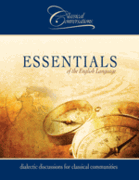In September, I posted about our morning involvement with our local Classical Conversations campus. I figured it was due time to tell you what our afternoons look like. My son and I spend our Wednesday afternoons in Essentials, a dialectic class designed to assist us in mastering the essentials of English grammar and writing, and increase speed and accuracy in arithmetic. In a two-hour time block, we spend 45 minutes studying English grammar, 45 minutes on a writing assignment from the Institute for Excellence in Writing (more on that in a later post), and 30 minutes in Math drills and games. Then, of course, we build on all this material throughout the week, during our regular homeschooling day.
Classical Education believes in a three part training of the mind, called the trivium. The first part states that young minds are well equipped to absorb information. Lots of information. The second part states that as a mind develops, students begin to think analytically. They begin to think through arguments and process new concepts. At this age, students are less interested in finding out facts than in asking “Why?” This usually begins around age 10, as their brains develop and their capacity for abstract thought begins to mature. The Essentials class is designed for this age child and taught very logically and dialectically.
This complete Language Arts program takes students beyond the worksheet. My son and I have a wealth of information now when it comes to grammar. This curriculum takes 'nouns' beyond a person, place, or thing. It teaches us that a noun names a person, place, thing, activity or idea. That nouns have uses or roles in sentences (subject, direct object, indirect object, object of the preposition, appositive, etc.) that those roles are recognizable and how we recognize them. It teaches that nouns have attributes (common, proper, concrete, abstract, etc.). It teaches that sometimes nouns can be hidden as an infinitive or a gerund, and sometimes used as an adjective or adverb. And more!
The class is taught in a three year cycle, and each year we are able to build on the information we learned previously. We are entering into the second half of the second year, and I'm thoroughly impressed at how much information my son has grasped and retained this second year. Our highest praise always comes from my husband (who is the smartest man I know and received an unbelievably high score on the verbal section of his GMAT 4+ years ago) when he says, "You two now know more about the English language than I do!"


No comments:
Post a Comment